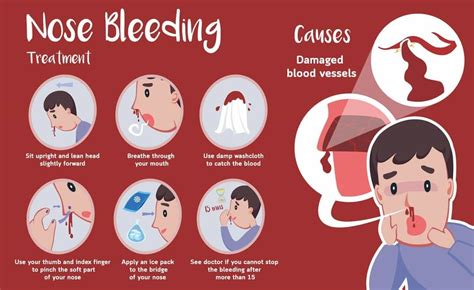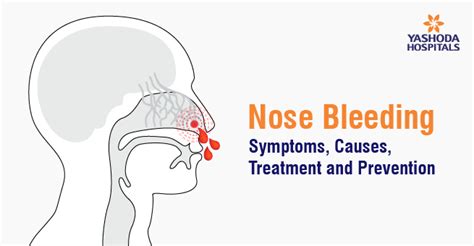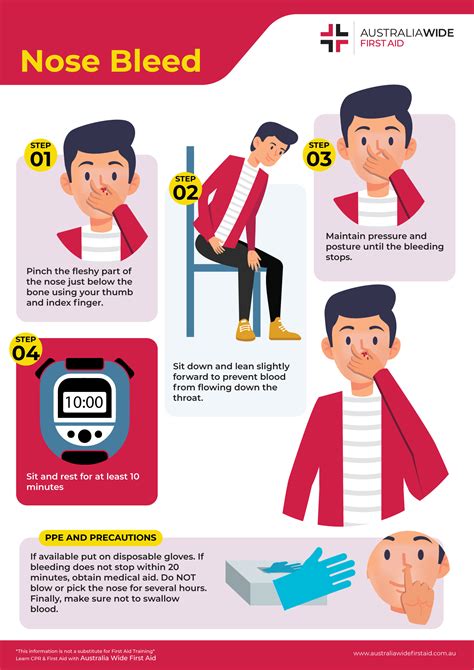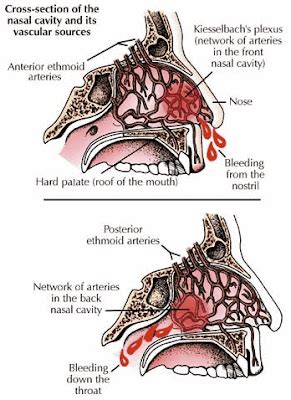Intro
Nose bleeding, also known as epistaxis, is a common condition that can be caused by a variety of factors. While it may seem like a minor issue, nose bleeding can be a sign of an underlying health problem. In this article, we will explore the different reasons why nose bleeding occurs and what you can do to prevent and treat it. Nose bleeding is a condition that affects millions of people worldwide, and it is essential to understand the causes and symptoms to seek proper medical attention when needed.
Nose bleeding can be caused by a range of factors, from minor irritations to life-threatening conditions. Some of the most common causes of nose bleeding include dry air, allergies, colds, and sinus infections. In some cases, nose bleeding can be a sign of a more serious condition, such as high blood pressure, a bleeding disorder, or a tumor. It is crucial to identify the underlying cause of nose bleeding to receive proper treatment and prevent future episodes. Understanding the different causes of nose bleeding can help you take steps to prevent it and seek medical attention when necessary.
Nose bleeding can be a frightening experience, especially if it is severe or recurrent. However, in most cases, nose bleeding is not a cause for concern and can be treated with simple home remedies. By understanding the different causes of nose bleeding and taking steps to prevent it, you can reduce your risk of experiencing this condition. Whether you are experiencing nose bleeding for the first time or have had recurring episodes, it is essential to seek medical attention if you are concerned about your symptoms. A healthcare professional can help you identify the underlying cause of your nose bleeding and provide you with the necessary treatment and guidance.
Nose Bleeding Causes

Common Causes of Nose Bleeding
Some of the most common causes of nose bleeding include: * Dry air * Allergies * Colds * Sinus infections * Nose picking * Blowing your nose too hard * Using certain medications, such as blood thinners * High blood pressure * Bleeding disorders * TumorsNose Bleeding Symptoms

Nose Bleeding Severity
Nose bleeding can be classified as either anterior or posterior, depending on the location of the bleeding. Anterior nose bleeding occurs in the front of the nose and is usually caused by dry air, allergies, or nose picking. Posterior nose bleeding occurs in the back of the nose and is usually caused by more serious conditions, such as high blood pressure or a tumor. It is essential to seek medical attention if you experience severe or recurrent nose bleeding, as it can be a sign of an underlying health problem.Nose Bleeding Prevention

Nose Bleeding Treatment
If you experience nose bleeding, there are several steps you can take to treat it, including: * Applying pressure to the nose * Using cold compresses to reduce swelling * Elevating your head to reduce blood flow * Avoiding strenuous activities * Taking over-the-counter pain relievers, such as acetaminophen or ibuprofen * Using nasal decongestants to reduce congestionNose Bleeding Complications

Nose Bleeding and Other Health Conditions
Nose bleeding can be a sign of an underlying health condition, such as: * High blood pressure: High blood pressure can cause nose bleeding by increasing blood flow to the nasal passages. * Bleeding disorders: Bleeding disorders, such as hemophilia, can increase the risk of nose bleeding. * Tumors: Tumors in the nasal passages or sinuses can cause nose bleeding. * Allergies: Allergies can cause nose bleeding by irritating the nasal passages and causing inflammation.What are the most common causes of nose bleeding?
+The most common causes of nose bleeding include dry air, allergies, colds, and sinus infections. Other causes include nose picking, blowing your nose too hard, and using certain medications, such as blood thinners.
How can I prevent nose bleeding?
+To prevent nose bleeding, you can use a humidifier to add moisture to the air, avoid allergens and irritants, use saline nasal sprays to keep the nasal passages moist, and avoid nose picking and blowing your nose too hard.
What are the symptoms of nose bleeding?
+The symptoms of nose bleeding include blood flowing from the nose, clots or streaks of blood in the nasal mucus, pain or discomfort in the nose, swelling or bruising around the nose, difficulty breathing or swallowing, and dizziness or lightheadedness.
How can I treat nose bleeding?
+To treat nose bleeding, you can apply pressure to the nose, use cold compresses to reduce swelling, elevate your head to reduce blood flow, avoid strenuous activities, take over-the-counter pain relievers, and use nasal decongestants to reduce congestion.
What are the complications of nose bleeding?
+The complications of nose bleeding include anemia, infection, scarring, and septicemia. In rare cases, nose bleeding can lead to life-threatening conditions, such as septicemia.
We hope this article has provided you with a comprehensive understanding of nose bleeding, its causes, symptoms, prevention, and treatment. If you have any further questions or concerns, please do not hesitate to comment below or share this article with your friends and family. By working together, we can raise awareness about nose bleeding and promote healthy living. Remember to always consult with a healthcare professional if you experience severe or recurrent nose bleeding, as it can be a sign of an underlying health problem. Take care of your health, and stay informed!
